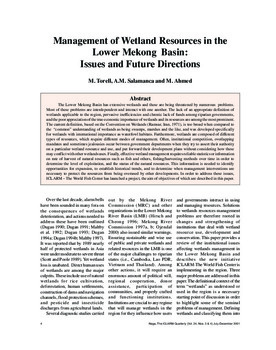Management of wetland resources in the lower Mekong Basin: issues and future directions

Citation
Torell, M; Salamanca, A.M.; Ahmed, M. (2001). Management of wetland resources in the lower Mekong Basin: issues and future directions. NAGA 24 (3-4): 4-10
The Lower Mekong Basin has extensive wetlands and these are being threatened by numerous problems. Most of these problems are interdependent and interact with one another. The lack of an appropriate definition of wetlands applicable to the region, pervasive inefficiencies and chronic lack of funds among riparian governments, and the poor appreciation of the true economic importance of wetlands and its resources are among the most prominent. The current definition, based on the Convention on Wetlands (Ramsar, Iran, 1971), is too broad when compared to the "common" understanding of wetlands as being swamps, marshes and the like, and was developed specifically for wetlands with international importance as waterfowl habitats. Furthermore, wetlands are composed of different types of resources, which require different modes of management. Often, institutional competition, overlapping mandates and sometimes jealousies occur between government departments when they try to assert their authority on a particular wetland resource and use, and put forward their development plans without considering how these may conflict with other wetlands uses. Finally, effective wetland management requires reliable statistics or information on rate of harvest of natural resources such as fish and others, fishing/harvesting methods over time in order to determine the level of exploitation, and the status of the natural resources. This information is needed to identify opportunities for expansion, to establish historical trends, and to determine when management interventions are necessary to protect the resources from being overused by other developments. In order to address these issues, ICLARM - The World Fish Center has launched a project, the aim of objectives of which are described in this paper.
Permalink
Date Available
Type
Publisher
Copyright
CC BY 4.0
Topics
Language